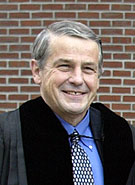Donald W. Harward
 Doctor of Humane Letters
Doctor of Humane Letters
“Donald W. Harward provided the context in which Bates words, concepts, and ideals could be made more real and available to everyone connected to the College,” wrote Bates Trustee Jeanne Dell’Osso Cohen ’73 upon the retirement of Bates’ sixth president, who served from 1989 to 2002.
Through expanded academic programs and campus facilities, spirited efforts to reach out beyond Bates, and a near-constant encouragement to the Bates community to engage in the work of the College collaboratively and with civility, Harward helped Bates discover ways to translate a traditional culture of hard work, egalitarianism, and social justice into greater excellence and national reputation.
“There are no spectator sports at Bates,” he once said. “The College depends on participation and involvement.” Bates created 22 significant new facilities and two dozen new academic programs during Harward’s tenure. Through increased study-abroad programs, more support for student-faculty collaborations, and a renowned service-learning program, students and faculty explored the world outside the traditional ivory tower, including Lewiston-Auburn.
“We reaffirmed the notion that learning carries a responsibility to the outside world,” Harward said. The LA Excels collaboration established under Harward, called “the most extensive community development project in the history of the state” by then-Maine Gov. Angus King, inspired Bates and the community to recast their relationship and identify shared aspirations; upon his retirement, the Bates Board of Trustees endowed the Donald W. and Ann M. Harward Center for Community Partnerships.
Prior to the Bates presidency, Harward taught and served at the University of Delaware, where he designed the University Honors Program, and then was vice president for academic affairs at The College of Wooster. He earned his Ph.D. in philosophy from the University of Maryland, and among his areas of published research are the foundations of mathematics, analytical philosophy, epistemology, and logic.
He is a senior advisor for the American Council on Education Fellows Program and a senior fellow with the American Association of American Colleges and Universities. He and his wife, Ann, have two children.